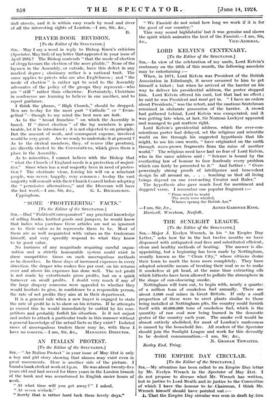PRAYER-BOOK REVISION.
[To the Editor of the SPECTATOR.] SIR,—May I say a word in reply to Bishop Knox's criticism (Spectator, May 3rd) of my letter that appeared in your issue of April 26th? The Bishop contends "that the mode of election of clergy favours the election of the more pliable." None of the laymen in the Assembly, or outside, have this defect in any marked degree ; obstinacy rather is a national trait. The same applies to priests who are also Englishmen ; and "the mode of election" is rather apt to send to the Assembly advocates of the policy of the groups they represent—who are " stiff " rather than otherwise. Fortunately, Christians in conference are learning to believe• in one another, and to expect guidance.
I think the phrase, "High Church," should be dropped. Men are to-day for the most part " Catholic " or " Evan- gelical "—though to my mind the best men are both.
As to the "broad franchise" on which the Assembly is based. If "direct election" of the lay members is prac- ticable, let it be introduced ; it is not objected to on principle. But the amount of work, and consequent expense, involved would be very great. Are we ready to undertake it at present ? As to the clerical members, they, of course (the proctors), are directly elected to the Convocations, which gives them a place in the Assembly.
As to minorities, I cannot believe with the Bishop that "what the Church of England needs is a protection of majori- ties." Since when has a real majority been in need of protec- tion? The obstinate vicar, forcing his will on a reluctant people, was never, happily, very common ; to-day the vast majority will consult with their Church Council before adopting the "permissive alternatives," and the Diocesan will have










































 Previous page
Previous page